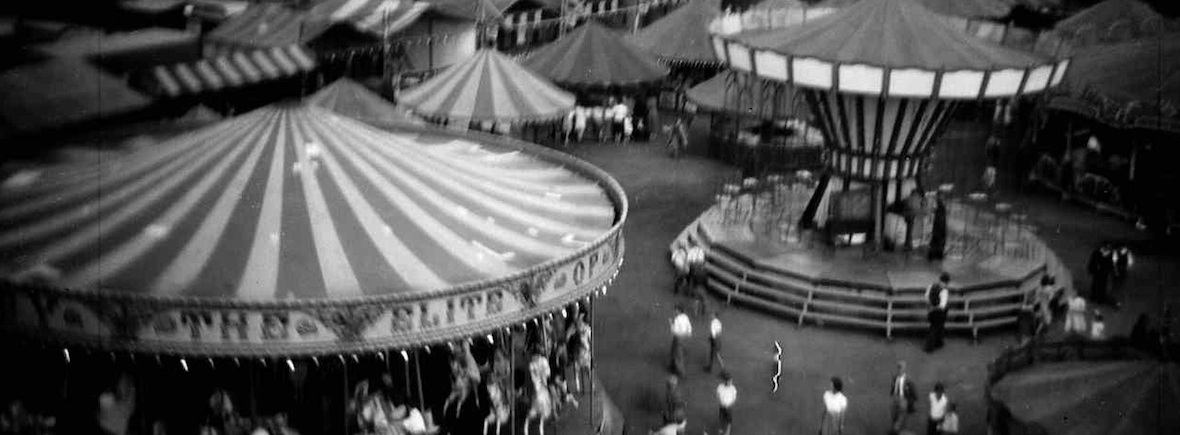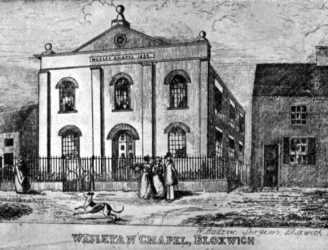Pat Collins, the legendary 19th-20th century fairground and cinema mogul, has had a long association with Bloxwich, but he was not from Bloxwich. He was born on May 12th 1858 in Cheshire but he did attend his first Wake in Bloxwich in 1882, and from that point rapidly transformed the travelling fairs.
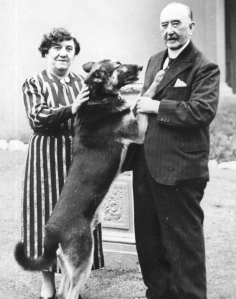
Pat Collins and his second wife Clara and Alsatian Dog 1930’s
Pat Collins had a number of encounters with Walsall Council when they tried to abolish the Wakes and focus people’s attention on the August Bank holiday instead – the Wake was becoming a “nightmare of drunkenness and lawlessness,” though much enjoyed by local colliers. In 1898 the council announced the Wakes were abolished – but on Saturday 13th August Pat Collins opened the fair as usual as he was trying to preserve the Bloxwich Wake. Eventually a compromise was reached and the event was called “Collins’ Grand Fete and Gala (in commemoration of Bloxwich Wakes).” By 1899 on the 12th of August, Mr. Collins advertised in the Walsall Observer that “Collins’ Grand Fete and Gala – to be held ‘in commemoration of the Bloxwich Wakes'” – to be held on a field, Tenter’s Croft, near the Pinfold, that he had leased.
His famous ‘Fair and the Bloxwich Wakes’ were held near his home Lime Tree House, on what is now the Asda Car Park. Lime Tree House was roughly where Sound Academy is today. Alongside all the other fairground delights such as ‘freak shows’ and boxing booths, he had tents showing short films. The popularity of these films led to him opening a cinema in Bloxwich (see below).
Video interview: Bloxwich resident Barbara Woolaston above talks about the Pat Collins fair and how much she liked the waltzers.
Read about the Bloxwich Lion who escaped in 1932.
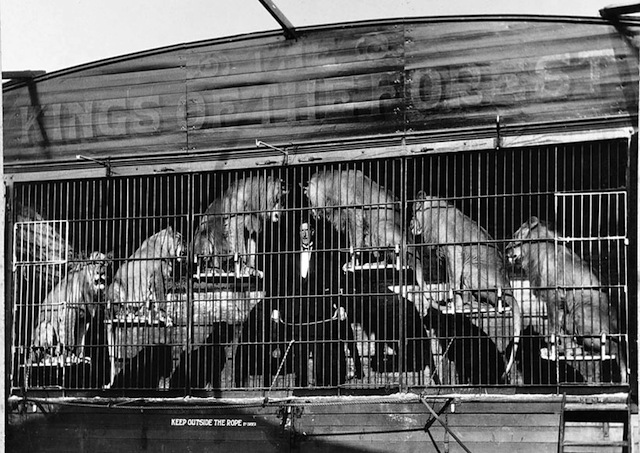
Capt Herbert Vincent Clarke and the Pat Collins Lions early 1930s
Pat Collins died in Bloxwich in 1943 and the Carnival Committee decided to put up a memorial, but war intervened and it look until 1955 to fulfil this ambition.
The Memorial Clock was built using money subscribed to the fund, including £100 from the Showman’s Guild that Pat helped to found. A member of the committee designed it and originally it was set up in the King George V Playing Fields. It was moved to the Promenade gardens in 1991, overlooking the area in which he had attended his first Wake, facing King George V Playing Fields.
Former Grosvenor Cinema – now The Bloxwich Showman pub
In the High Street is the former Grosvenor Cinema, now run as a pub by Wetherspoons.
Before the Grosvenor there was The Electric Palace cinema on this site, holding four hundred patrons. Built by Thomas Jackson of Alhambra Picture Palaces Ltd, and the earliest known show there was on 30th December 1912, when ‘Romance of the Coast’ was screened. The Electric Palace was basically a timber shed clad in corrugated iron, with a decorative façade, and a balcony added in 1913. At the end of the Great War The Electric Palace was bought by Pat Collins, the famous showman and politician, later Mayor and MP for Walsall.
Collins replaced the Electric Place with the new thousand seat cinema, the Grosvenor, in 1922, built by J & F Wootton for £12,000. It was designed by Hickton & Farmer, with the frontage in a classical style, finished in Hathernware terracotta. It was was opened on 11th December 1922 by Lady Arthur Grosvenor of Chester, a friend of Collins. The film that followed was ‘The Three Musketeers’ and the proceeds raised £26.00 for Walsall YMCA.
While it was being built, Pat Collins showed films at The Central, which was originally The Bloxwich Wesleyan Methodist Church built in 1832. It is now a furniture shop.
In 1935, Pat Collins sold the Grosvenor to Oscar Deutsch and it became an Odeon.
It closed following the screening of ‘Operation Amsterdam’ on May 2nd 1959, ironically just before local celebrations were organised to celebrate the centenary of Pat Collins’ birth.
The building has survived, being revived in the early 1980’s as the ‘Flix’ disco night-club, and was for a number of years in the hands of the Bloxwich Community Partnership as the Electric Palace youth centre. In 2014, after being closed for some time, the building was taken over and rebuilt by pub company J.D.Wetherspoon, eventually opening early in 2015 as a pub, The Bloxwich Showman, named in honour of Pat Collins.
Other cinemas were popular too including the Rosum, which is now Farm Foods. Hear Maude’s story about the cinema in the main film.
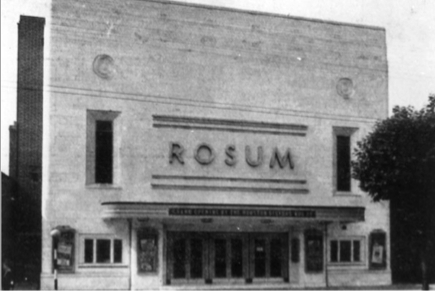
The Rosum Cinema 1930’s

